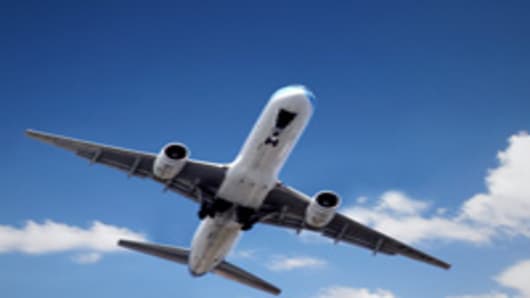Although airlines send more planes into Super Bowl host cities in the days before and the days after, Smith said the bump in price didn't have to do with trying to match greater operational expenses.
Aviation consultant Michael Boyd of Boyd Group International told me that he doesn't think that there will be enough demand for next day airlines surcharges to spread to other cities where big sporting events take place, but that's something that is clearly up for debate.
"At all these big sporting events, all the sectors of business — from hotels to ground transportation — have done a good job at maximizing the money they make," said Robert Tuchman, executive vice president for Premiere Global Sports, a high-end sports travel and hospitality firm. "Maybe this is the airline's way of telling us they can do a better job of maximizing those dollars."
Tuchman, who is also the author of "The 100 Sporting Events You Must See Live," says he can see airlines experimenting with next day surcharges for at least 10 big sporting events, where convenience is important to a customer who is willing to pay a premium.
"I don't see why they couldn't do this on the Monday after the Kentucky Derby for all flights out of Louisville," Tuchman said.
American's Smith would not comment on whether or not a surcharge would be coming to other sporting events.
Along with the Super Bowl surcharge, the airlines also disclosed surcharges on some other highly trafficked days through April. But unless you heard of the surcharge, you wouldn't have come across it while buying a ticket.
The $50 is factored into the price of the ticket for anyone who chooses to leave from the three south Florida airports on Feb. 8.
"It's hard to find this fee, unless you are a travel consultant," said Bob Harrell, principal of Harrell Associates, a travel and aviation consulting firm.
While it's not clear what the exact demand for Super Bowl flights will be, because the teams/cities aren't known until two weeks before the event, fewer available flights this year might have already contributed to sky high prices.
Let's assume the two teams that are still undefeated, the Colts and the Saints, face off in the Super Bowl.
As of Wednesday morning, the cheapest non-stop flight we could find leaving from New Orleans on the Friday before the game and leaving out of Miami on the taxed Monday was an American flight for $925.
The cheapest non-stop flight from Indianapolis to Miami was an American flight for $717.
While the airlines might catch some heat for the Super Bowl surcharge, it's hard to argue that what the airlines are doing are unethical, says Scott Tinley, a two-time winner of the Ironman who teaches the sociology of sports at San Diego State's Sports MBA program.
Said Tinley: "Free market capitalism and the commercialization of sports play off each other perfectly. This is just another example of that."
Questions? Comments? SportsBiz@cnbc.com



